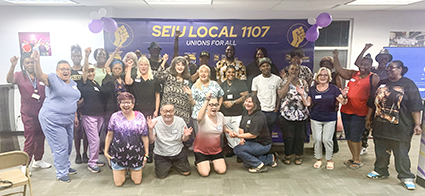“Life-changing” $16 Minimum Wage Goes into Effect for 13,000 Nevada Home Care Workers Following Years of Strong Union Advocacy
January 23, 2024 by agutting@reviewjournal.com
Filed under Feature
After pay had stagnated at around $11 an hour for over a decade, the new minimum wage will help solve the workforce shortage crisis so Nevada’s rapidly-aging population and people with disabilities get quality care
Las Vegas, NV — 13,000 Nevada home care workers’ lives are beginning to change dramatically as they start to see the state’s new $16 minimum wage show up in their paychecks. The average wage had previously stagnated at around $11 for over a decade, creating a crisis-level workforce shortage. Along with their union, SEIU Local 1107, caregivers successfully passed the groundbreaking minimum wage and a 42% funding increase through the state legislature last year. The new minimum wage, which went into effect January 1, is a transformational step toward supporting, recruiting and retaining workers to ensure quality care for Nevada’s rapidly-aging population and people with disabilities.
“I care for a woman in her 90’s and treat her like my own grandma,” said Ewa Landowski, a Las Vegas home care worker. “I bring her my homemade pierogies, delicious dumplings from my native Poland. But on my previous wage of $12, it was extremely difficult to take care of myself and my own health needs. I had to scrimp on groceries and I’m still paying off debt for dental work to replace two front teeth. With the $16, I can wipe out that debt and buy better food to eat like fish once and while. With our union and the $16, we can keep ourselves healthy so we can be there for our clients who we love and care for.”
The momentum from the wage and funding victories has snowballed into one of the largest union organizing drives in recent history, with over 1,000 home care workers voting by a landslide to unionize in a series of nine elections over the past year. Those newly unionized workers have been negotiating union contracts with their employers and pushing them to use increased state funding for raises above the $16 and other urgent improvements. Hundreds more workers are currently organizing and are heading toward union elections as well.
“I do this work because I have a deep love for helping people, especially our dear seniors,” said Sheila Hall, a home care worker in Las Vegas. “I not only provide all the daily care my clients need, but also lift their spirits when they are feeling lonely. Despite my essential work, I have past due bills for electricity because of my ridiculously low wages. That’s why I voted to join the union, so we could have a strong, united voice for change. The $16 minimum wage will help recognize our hard work and attract more caregivers into this vital field.”
The home care workforce is 85% women and majority people of color. They help with all the daily activities that enable seniors and people with disabilities to live at home with dignity, health and well-being. Duties include bathing, feeding, taking clients to doctors appointments, grocery shopping, picking up prescriptions and medication reminders.
A “Silver Tsunami” has been crashing over Nevada as the state’s older population grows much faster than the rest of the country. There are currently almost half a million Nevadans over the age of 65, and because the vast majority would strongly prefer to live at home, demand for services has been skyrocketing. But families increasingly cannot find caregivers for their loved ones due to severe difficulties with recruitment and retention of workers. Despite being one of the fastest-aging states in the nation, Nevada has had among the lowest funding rates for home care services. A research report by the nonpartisan Guinn Center found that one out of two home care workers leave their jobs in the first year, and Nevada will need 5,300 additional personal care aides by 2026.
Workers built a grassroots movement and methodically carried out a series of strategic steps to accomplish the minimum wage. Three years ago, workers began organizing throughout the state, speaking out powerfully in the press and on social media, and generating support among community allies. In 2021, workers advocated strongly to establish a first-in-the nation Home Care Employment Standards Board. Workers pushed the Standards Board to pass a set of policy recommendations, including the minimum wage and funding increase. Then, workers again lobbied their legislators to pass those recommendations as part of the 2023 state budget.
In addition to setting the minimum wage, the budget increased the “Medicaid Reimbursement rate” – the funding that home care employers receive for providing services – from $17.56 to $25 an hour, the first meaningful change in over 20 years. Most home care services in the state are delivered by private agencies funded through Medicaid.
“I can sum up what the $16 means to me in one word: freedom,” said Regina Brown-Ross, who cares for two senior clients and two neurodiverse clients. “Under my previous wage of $12, I was scraping by paycheck to paycheck, struggling to barely keep a roof over my head, gas in my car and food on the table. Now because of our union, government officials heard our call for help and we achieved concrete change. But we’re not going to stop here, no way. We’re going to keep building our movement to make sure our agencies use the increased state funding as lawmakers intended: to invest in us so we can provide the absolute best care for our clients.”






